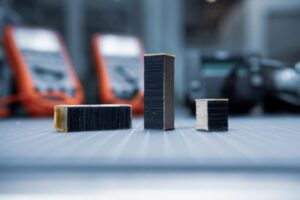Datwyler positions itself for the future with electroactive polymers
Schattdorf, Switzerland – Datwyler is strengthening its position with the innovative future technology of electroactive polymers and has secured this with corresponding patents. Electroactive polymers in a unique stacked design enable completely new applications in the car of the future and in the markets of the General Industry business unit. Examples include thermal management in electric vehicle batteries or haptic feedback and morphing surfaces in human-machine interface applications.
Datwyler, a specialist for system-critical elastomer components, is strengthening its position for the innovative future technology of electroactive polymers. To do so, it has obtained several patents with the acquisition of the Swiss start-up CTsystems. The parties have agreed not to disclose the performance-based purchase price. Datwyler has already been working closely with the spin-off of the Swiss Federal Laboratories for Materials Science and Technology (EMPA) since 2018.
“Our electroactive polymers in a unique stacked design are a promising future technology that will enable completely new and diverse applications in the car of the future and in the markets of our General Industry business unit. With our strengthened expertise in electroactive polymers, we are a leading supplier for smart-rubber applications. I am convinced that the technology with electroactive polymers has the potential to become one of our high-revenue product lines in the long term,” says Datwyler CEO Dirk Lambrecht.
Basically, electroactive polymers convert electrical energy into sensitive and versatile mechanical motion through elastic deformation. With the patented solution from Dätwyler, it is possible for the first time to produce stack actuators on an industrial scale. Thanks to the unique stack design, conventional actuator technologies can be replaced by this more attractive technical solution in various application areas. The advantages of the new technology include: Low energy consumption, fewer mechanical parts, low weight and volume, a robust and durable design, and noise-free operation with sensor and haptic feedback functionality. Datwyler is currently working to build the proprietary, highly automated production line at its existing Swiss plant. Lab samples are already available, and delivery of the first industrial prototypes is planned for early 2024.
Datwyler’s stacked electroactive polymers offer a wide range of novel actuator and sensor applications. Thus, they can be used to control switches, locks, valves and to operate pumps. Applications include thermal management in electric vehicle batteries, for example, as well as actuation of mechanical components, dashboard vents or valves for pneumatic massage seats for drivers and passengers. Electroactive polymers can also realize haptic feedback and morphing surfaces for human-machine interface applications. Examples include haptic feedback on displays and on the steering wheel, or control elements morphing out of the plain surface and becoming active when approached. Discussions with existing and potential customers, as well as initial development projects, show that both vehicle manufacturers themselves and suppliers of technical systems and interiors are very interested in the new possibilities offered by Datwyler’s stacked electroactive polymers.

